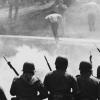The Red Scare and Red Summer of 1919
Street Scribe

Attorney General Mitchell Palmer’s house after it was bombed on June 2, 1919.
Billy Joel was right: "The good old days weren't always good." A century ago, in 1919, Americans lived in times that were both filled with hope and fraught with peril. The Versailles Treaty that brought a formal end to World War I was viewed as a triumph for President Woodrow Wilson in the postwar world.
Here in Athens, a full-page advertisement placed in the July 1, 1919 edition of the Athens Banner newspaper by downtown clothing store W.T. Collins & Company conveyed American optimism after the carnage of war. The ad touted the peace treaty as "the beginning of the most glorious chapter in human history."
The Athens Banner's editorial comments were no less sanguine about the postwar world. In a commentary called "The New Independence," the local newspaper a century ago said, "A better understanding has been brought about and the future will be filled with peace and harmony throughout the world. No one country can ever again stir and disrupt the allied nations and no one country will ever attempt such again."
It didn't take long for such dreams to die in the America of 1919. Immigrants were looked upon with fear and suspicion as possible terrorists or labor agitators. Women still had not attained the right to vote nationwide, but the Prohibition movement was gaining momentum. (Both women's suffrage and alcohol prohibition would take effect across America in 1920.) A Democratic president who had promised to "make the world safe for democracy" instead presided over an America where democracy was imperiled by his administration's "Red Scare" round-up, detention and deportation of domestic and foreign-born dissidents.
"It was an era of lawless and disorderly defense of law and order, of unconstitutional defense of the Constitution, of suspicion and civil conflict—in a very literal sense, a reign of terror," wrote historian Frederick Lewis Allen. "A cloud of suspicion hung in the air, and intolerance became an American virtue," he said in his engaging volume Only Yesterday. Fears of revolution and terrorism at home and abroad were mirrored in front-page stories in the Athens Banner as Americans celebrated the July 4 holiday in 1919. "Reds Plan for Death Reign" screamed a headline above a story about the executions of 40 anti-communist young people in Hungary. On the same front page, a story headlined "Nation on Guard Against Bomb Men" said that police across the nation were on high alert against "reported plans of anarchists and other radicals to create a reign of terror by bomb explosions" during the holiday.
America was already a nervous nation after a string of terrorist bomb attacks, including the detonation of a powerful bomb that heavily damaged the Washington, DC home of the nation's attorney general just a month earlier. Race riots flared up in towns, cities and rural hamlets throughout the nation, and lynchings of African Americans were grisly spectacles across the land. During the sweltering summer of 1919, a racial incident erupted in Chicago that led to full-scale riots and the deaths of at least 38 citizens after a young African American was drowned after he floated into a "whites only" section of Lake Michigan and was pelted with stones by a white mob on the beach. Then days of rioting began in the Windy City. White gangs entered black enclaves, setting fires, looting and assaulting residents. The bloody battles of 1919 gave that era the name "Red Summer." In his history book of the same name, writer Cameron McWhirter says that African Americans who had fought for democracy overseas in World War I were not going to settle for less when they returned home from "over there." He called the "Red Summer" of 1919 the first stirrings of an emboldened movement for black equality.
A century ago, in 1919, an America that called itself the land of the free was overshadowed by clouds of repression. Immigrants to our shores and dark-skinned American citizens both were reviled in a nation that claimed to believe that "all men are created equal." Today we would do well to consider our world a century ago as we take to heart the famous admonition from philosopher George Santayana: "Those who cannot remember the past are condemned to repeat it."
More by Ed Tant
-

Study Shows Pandemics Can Give Rise to Fascism
Street Scribe
-

Six Plague Page-Turners to Read During the Pandemic
Street Scribe
-










comments